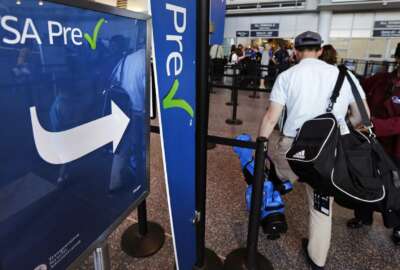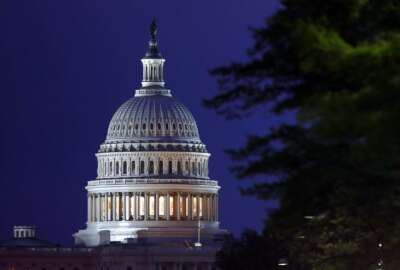
One group of federal attorneys is pushing for a little pay equity
Assistant U.S. Attorneys, career civil servants, are asking Congress to end what the attorneys feel is unfair pay disparity compared to other lawyers, in the...
Best listening experience is on Chrome, Firefox or Safari. Subscribe to Federal Drive’s daily audio interviews on Apple Podcasts or PodcastOne.
They do the day to day legal work of the United States. And they didn’t take the jobs to become rich lawyers. But the assistant U.S. Attorneys, career civil servants, are asking Congress to end what the attorneys feel is unfair pay disparity compared to other lawyers, in the Department of Justice. For more, the president of the National Association of Assistant U.S. Attorneys, Larry Leiser, joined Federal Drive with Tom Temin.
Interview transcript:
Tom Temin: Mr. Leiser, good to have you on.
Larry Leiser: Tom, thanks for having me. I am currently an assistant United States attorney for the Eastern District of Virginia. But talking with you today is solely in my capacity as president of the National Association of Assistant United States Attorneys, and nothing that I say or suggest should be considered to be the decision of the Department of Justice.
Tom Temin: Okay. And by the way, that association is an association. You’re not really a labor union – are you?
Larry Leiser: We are not a labor union. We are precluded from being a union, in fact.
Tom Temin: Okay. First of all, give us a sense of what the job is all about, because I guess you’re a notch below the politically appointed us attorneys and so you can actually do the work.
Larry Leiser: That’s right. In our country we have 93 presidentially appointed US attorneys. They come and go with the administration. For the most part, Assistant United States Attorneys are career professionals, civil servants of the federal government. We are the nation’s prosecutors, and we also are the nation’s civil attorneys in defending the United States in court. As prosecutors, we work with the FBI, DEA – all the law enforcement associations at the federal level have to go through Assistant United States Attorneys to get search warrants complaints, to get cases indicted, obviously, in cases tried to get wiretaps. And we also work frequently with state and local officials who become part of federal Task Force on major criminal investigations.
Tom Temin: And are you regular Title Five employees under the GS system?
Larry Leiser: No, not under the GS system. And this is where the pay disparity comes into play. Almost every federal employee is paid under the so called GS system. We’re paid on a system called administratively determined, the AD system. So our colleagues who work in the Department of Justice who are not Assistant United States Attorneys, although they are attorneys, they perform in different tasks and functions at the Department of Justice. They’re all paid under the GS system. And we’re finding out that there is a significant disparity, especially in the early years, of comparing experience with years out of law school, where our colleagues around the country who are our nation’s prosecutors are paid significantly less than other attorneys in our own agency. And we think that’s just not fair. And we’d like to get the Congress to change that. We’ve asked the department to change that, and they could administratively do so, switch us from the AD system to the GS system, but have not done so to date. So we’re turning to the Congress in hopes that they will recognize this disparity and the unfairness of having our nation’s prosecutors working for the same agency where other lawyers are paid significantly more, especially in the early years of service.
Tom Temin: Yeah, give us an example of the pay disparity – for example, someone that might have been out of law school five years, say, and they are a Assistant US Attorney versus a lawyer somewhere else and justice. What do the pay scales look like?
Larry Leiser: Well, it depends on the years out of law school and years of experience, but it can be anywhere from $20-to-40,000. In fact, I have lost because I’m officed in Alexandria, many of my colleagues have left our office to go over to the Department of Justice to immediately pick up on the GS Schedule, 20, 30 in some instances, more money in salary. Conversely, we have department attorneys who want to go back to their home state as a AUSA and have to take a $20-to-30,000 pay cut in order to do so. So it’s clearly a situation that needs to be resolved. And again, we’re not asking for more money as AUSAs, we just like to get the same money as our colleagues at DOJ. And quite frankly, every lawyer with the exception of the SEC, that works for the government under the GS system.
Tom Temin: We’re speaking with Larry Leiser, he is the president of the National Association of Assistant United States Attorneys. So are you asking Congress to make that legal switch to GS or simply to somehow mandate the administrative determination that you should get more money concurrent with what you would be getting if you were in GS?
Larry Leiser: We’re happy to do it one way or the other quite frankly. We think switching to the GS system is just simple and clear cut. Adjusting the AD system, which is antiquated, and quite frankly, very confusing. The adjustment could be made there to have parity. But we think switching to the GS system is just simpler and cleaner, and we hope the Congress will explore that and make the change.
Tom Temin: And you’ve written to the chairman and Ranking Member of the Subcommittee on Commerce, Justice, Science and related agencies in the House – any response yet so far?
Larry Leiser: Not yet. We’re still working on it. Congress is very busy at this time with other matters. We understand that ours is not high on their priority list, but we hope then with time, they’ll recognize that this is something that should be fixed in fairness, and will give us the opportunity to go back to them and get them to make the switch.
Tom Temin: In the letter, you cite the fact that in the Employee Viewpoint Surveys every year, the agencies rank pretty well, except for that area of salary. So the job and the work are satisfying, aren’t they?
Larry Leiser: Absolutely. Every AUSA, if you ask, those of us who leave do either go over to the department, make more money, or many go into private practice will tell you that the best job they ever had was being an Assistant United States Attorney to the man and woman. We’re really honored to be the nation’s gatekeeper of our justice system. Nobody’s going to get prosecuted in our country without going through and assist the United States Attorney or another DOJ attorney. We control, exclusively control, the most powerful weapon in the federal law enforcement arsenal, which is the grand jury, and we’re all proud to be able to make sure that the innocent are protected and that the guilty are prosecuted. It’s a great honor, it’s also a great responsibility.
Tom Temin: And Attorneys General come and go, and now we have Mr. Garland there at the top of the Justice Department. Have you raised the issue with him and his predecessors?
Larry Leiser: We certainly have over the last several years, and the department has finally acknowledged that there is a disparity in pay, but they haven’t taken any steps to correct that disparity.
Tom Temin: Alright. So now you’re kind of on wait, the ball is in the court of Congress at this point?
Larry Leiser: Well, actually, the balls in the court of the Department of Justice. As I mentioned earlier, the AG could by zone authority switches from AD to the GS schedule, but has not yet decided to do that although we’ve asked – and therefore we’re going to the Congress in the hopes that they’ll make the fix.
Tom Temin: It seems like a good year to try to push for this since the administration is kind of slathering money over all the agencies pretty much.
Larry Leiser: Yeah, it does seem an appropriate time for us. And again, we’re not asking to be paid more. We just want to make the same salary as our attorney colleagues at DOJ and other attorneys throughout the government.
Tom Temin: And by the way, how many of there are you – and how is morale generally, given the conditions, the work itself, the conditions and the pay?
Larry Leiser: It’s about 6,300 Assistant United States Attorneys throughout the country. We’re in 94 US Attorney’s offices throughout the country. On this issue of pay, it is a morale issue, because we work extremely hard. We don’t get overtime pay, like our agents do. We don’t get the benefit of law enforcement retirement, although they’re clearly part of the law enforcement family at the federal, and even working with our state and local colleagues. So it’s a little depressing, quite frankly, to have our own agency not compensated fairly and equally to other attorneys within that agency. If you ask Assistant United States Attorneys, even those who have left, they’ll tell you to the man and woman that being an Assistant United States Attorney was the best job they ever had. But we all have families, and we all need to take care of our loved ones. More of us are making their career, but yet our retention rate is not very high, quite frankly. And our Assistant United States Attorneys don’t evaporate, they become defense attorneys. So in many ways, the department, by not compensating us fairly and equitably, becomes a training ground for the defense bar, which is again not helpful to our own morale.
Tom Temin: Larry Leiser is president of the National Association of Assistant US Attorneys. Thanks so much for joining me.
Larry Leiser: Thanks for having me, Tom.
Copyright © 2025 Federal News Network. All rights reserved. This website is not intended for users located within the European Economic Area.
Tom Temin is host of the Federal Drive and has been providing insight on federal technology and management issues for more than 30 years.
Follow @tteminWFED





